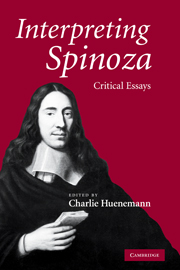Book contents
- Frontmatter
- Contents
- Notes on contributors
- Method of citation
- Introduction
- Chapter 1 Representation and consciousness in Spinoza's naturalistic theory of the imagination
- Chapter 2 Rationalism run amok: representation and the reality of emotions in Spinoza
- Chapter 3 “Whatever is, is in God”: substance and things in Spinoza's metaphysics
- Chapter 4 Necessitarianism in Spinoza and Leibniz
- Chapter 5 Epistemic autonomy in Spinoza
- Chapter 6 Spinoza and the philosophy of history
- Chapter 7 Democracy and the good life in Spinoza's philosophy
- Chapter 8 Spinoza's unstable politics of freedom
- Chapter 9 Should Spinoza have published his philosophy?
- Bibliography
- Index
Chapter 9 - Should Spinoza have published his philosophy?
Published online by Cambridge University Press: 22 September 2009
- Frontmatter
- Contents
- Notes on contributors
- Method of citation
- Introduction
- Chapter 1 Representation and consciousness in Spinoza's naturalistic theory of the imagination
- Chapter 2 Rationalism run amok: representation and the reality of emotions in Spinoza
- Chapter 3 “Whatever is, is in God”: substance and things in Spinoza's metaphysics
- Chapter 4 Necessitarianism in Spinoza and Leibniz
- Chapter 5 Epistemic autonomy in Spinoza
- Chapter 6 Spinoza and the philosophy of history
- Chapter 7 Democracy and the good life in Spinoza's philosophy
- Chapter 8 Spinoza's unstable politics of freedom
- Chapter 9 Should Spinoza have published his philosophy?
- Bibliography
- Index
Summary
The full title of Spinoza's Tractatus Theologico-Politicus (TTP) reads as follows:
THEOLOGICAL-POLITICAL TREATISE: Containing several discussions In which it is shown that the Freedom of Philosophizing not only can be granted without harm to Piety and the Peace of the Republic, but also cannot be abolished unless Piety and the Peace of the Republic are also destroyed.
Freedom of thought is quite central to Spinoza's politics in the TTP. In fact, since thought is outside the ability of the sovereign authorities to control, control is not possible. And where control is not possible, there is no right to control. But Spinoza takes this one step further, and argues that from freedom of thought follows the freedom to express publicly that which is thought. Even so, Spinoza recognizes certain limits on the freedom of expression. Expressing one's thoughts is an act, an act that can have effects in the society as a whole. Criticisms of individuals and institutions, even if well-reasoned and true, can lead to consequences which undermine the stability of the state. Criticizing the divinity of the Bible, or the divine authority of the clergy, or the necessity for performing certain ceremonies or keeping to certain divinely ordained laws can lead to the general decline of religion. And insofar as religion can contribute to the stability of the state by inducing people to behave well toward one another, the complete and unrestrained freedom of expression could well have bad consequences for the stability of the state.
- Type
- Chapter
- Information
- Interpreting SpinozaCritical Essays, pp. 166 - 187Publisher: Cambridge University PressPrint publication year: 2008
- 19
- Cited by



